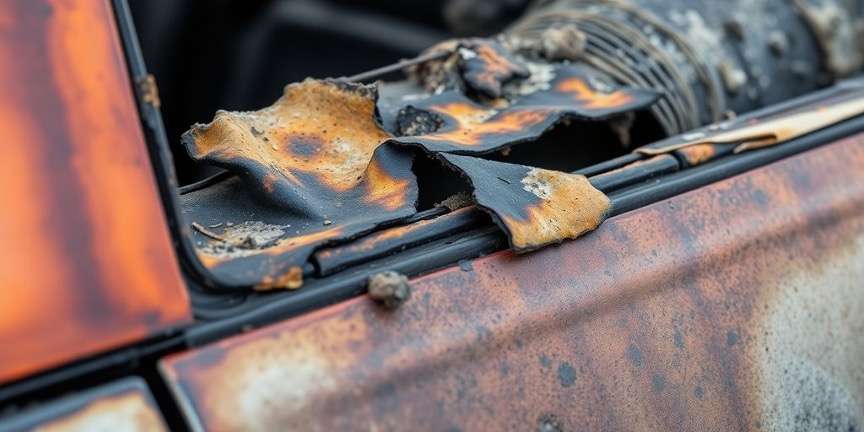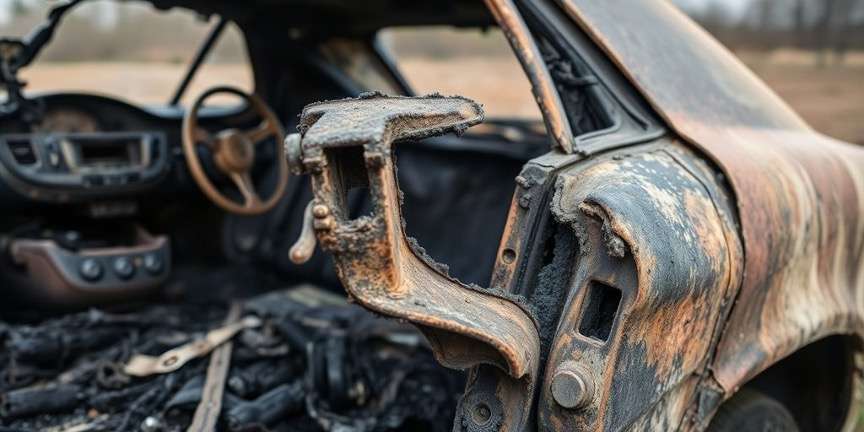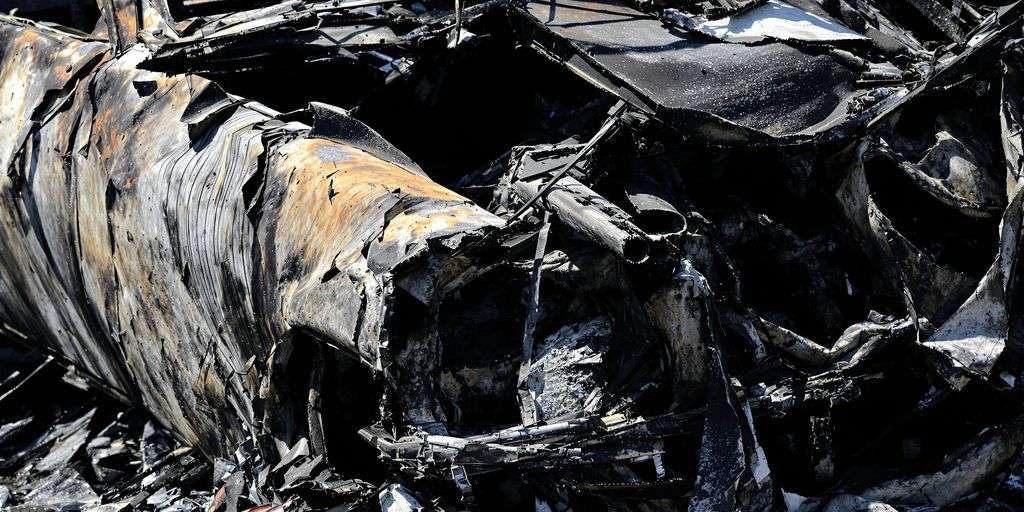Key Takeaways
- Fire damage can significantly lower a car's resale value, but there are still options to sell it.
- Dealerships might not offer much for a fire-damaged car, but online platforms and salvage yards could be more promising.
- Selling car parts individually might yield more money than selling the whole car.
- Donating the car can provide a tax deduction, which might be beneficial depending on your financial situation.
- Always document the damage and gather necessary paperwork before attempting to sell.
Understanding Fire Damage and Its Impact on Car Value
Assessing the Extent of Fire Damage
When dealing with a car that's been through a fire, the first step is figuring out just how bad the damage is. Fires can mess up a car in all sorts of ways, from melting the exterior to messing up the inside with smoke and soot. You might see warped paint, melted plastic, and even damage to the tires. Inside, smoke can leave behind a smell that just won't quit and can mess with the electronics. If the fire was intense, the structural integrity of the car could be compromised, making it unsafe to drive.
How Fire Damage Affects Resale Value
Fire damage can seriously hit your car's resale value. A car with fire damage is often seen as a risky buy. Buyers worry about hidden issues that might crop up later. Even if the car looks okay after some repairs, the history of fire damage can make it less appealing. It's not just about the visible damage; potential buyers are also concerned about long-term reliability and safety. This stigma can make it tough to get a decent price if you're trying to sell.
Insurance Implications of Fire-Damaged Cars
Insurance can be a bit of a minefield when it comes to fire-damaged cars. If you've got comprehensive coverage, you might get some help with repair costs or even a payout if the car is deemed a total loss. But remember, you'll probably have to pay a deductible first. If your car is totaled, your insurer might offer you the pre-fire value of the car, minus the deductible. However, getting insurance again on a fire-damaged car can be tricky. Some companies might not want to cover it, or they might charge higher premiums. It's important to weigh these factors when deciding what to do with a fire-damaged vehicle. For more on how fire and flood damage can lead to a total loss, check out this guide.
Selling a fire-damaged car isn't straightforward. Understanding the full impact of the damage and knowing your options can help make the process a bit less daunting.
Exploring Traditional Selling Options for Fire-Damaged Cars
Selling to a Dealership: Pros and Cons
When it comes to selling a fire-damaged car, one of the first options many consider is heading to a dealership. Dealerships might offer convenience, but they also have their downsides. On the plus side, selling to a dealership is usually fast. You drive in, they assess the damage, and you get an offer. However, the offer might be lower than selling privately because dealerships need to make a profit when they resell or scrap the vehicle. It's important to weigh the ease of the transaction against the potential financial loss.
Private Sales: What to Expect
Opting for a private sale can sometimes yield a better price, but it requires more effort. You'll need to advertise the vehicle, often through online platforms or community boards. It's crucial to be transparent about the fire damage to avoid any legal issues down the line. Be prepared for negotiations and possibly a longer wait to find a buyer willing to take on a fire-damaged car. The key here is patience and effective communication.
Trade-In Opportunities for Damaged Vehicles
Trading in a fire-damaged car is another route you might explore. Some dealerships accept trade-ins regardless of condition, though the trade-in value will reflect the car's damage. This can be a good option if you're looking to purchase another vehicle and want to offset the cost. Keep in mind that trade-in values can vary significantly, so it might be worth getting multiple quotes to ensure you're getting a fair deal.
Leveraging Online Platforms to Sell Your Fire-Damaged Car
Top Websites for Selling Damaged Cars
When it comes to selling a fire-damaged car online, several platforms can make the process smoother. CashForCars.com is a notable option, offering a straightforward process where you fill out a form with your car's details and receive a cash offer quickly. They even handle the pickup for free, so you don’t have to worry about logistics.
Another platform to consider is BidSpace, which specializes in auctioning damaged vehicles. This site provides detailed listings, helping potential buyers assess their options thoroughly. SellMax.com is also worth checking out, known for its transparent dealings and no hidden fees, ensuring you get a fair deal.
Creating an Effective Online Listing
To attract buyers, your online listing needs to be compelling. Start with clear, honest descriptions of your car's condition, including the extent of the fire damage. High-quality photos are crucial; they give potential buyers a real sense of what they’re getting. List key details like make, model, year, and mileage.
Consider highlighting any parts that are still in good condition. This can appeal to buyers looking for specific components. Be upfront about any repairs needed to avoid misunderstandings later.
Avoiding Scams and Fraud Online
Selling anything online comes with risks, and cars are no exception. Here are some tips to keep you safe:
- Know the buyer: Use platforms that verify buyer identities or provide some level of security.
- Secure payment methods: Opt for secure payment options, avoiding cash transactions when possible.
- Watch for red flags: Be wary of buyers who rush the process or offer more than your asking price.
Selling a fire-damaged car online can be a convenient way to offload a vehicle that might otherwise sit unused. With the right approach, you can connect with buyers who see the potential in your damaged car.
Maximizing Returns Through Salvage Yards and Junkyards
Understanding the Salvage Process
When your car is beyond repair, salvage yards can be a great option. These places buy cars that are no longer drivable, mainly for their parts and scrap metal. The process is simple: you contact a salvage yard, provide details about your vehicle, and they offer you a price. If you agree, they tow away your car, often at no extra cost. This is a hassle-free way to dispose of a fire-damaged car.
Negotiating the Best Price with Junkyards
Getting the best price from a junkyard requires a bit of negotiation. Start by researching what your car might be worth in its current state. You can use online tools or resources like the Kelley Blue Book to estimate its value. When you talk to the junkyard, be upfront about the condition of your car. If you have any valuable parts, mention them. Some yards might offer more if they know they can sell parts individually.
Benefits of Selling to Auto Salvage Yards
Selling your fire-damaged car to an auto salvage yard has several perks. First, you avoid the need for costly repairs. Salvage yards buy cars “as-is,” so you don’t have to spend money fixing it up. Plus, they often provide free towing, saving you the hassle of transporting a non-functional vehicle. Finally, payment is usually quick, with cash or check provided on the spot. This makes it a convenient and efficient way to deal with a damaged vehicle.
Considering the condition of your car, selling it to a salvage yard could be the easiest and most profitable option. It's a simple transaction that gets your car off your hands and puts some cash in your pocket.
Considering Alternative Options for Selling Fire-Damaged Cars

Donating Your Car for a Tax Deduction
If your fire-damaged car is beyond repair or you simply want to do some good, donating it can be a great option. Many charitable organizations accept vehicles, even those that are not in running condition. By donating your car, you might qualify for a tax deduction, which can be beneficial when tax season rolls around. Just make sure to get a receipt from the charity and confirm that they're a qualified organization with the IRS.
Selling Car Parts Individually
Sometimes, the sum of a car's parts is worth more than the whole, especially when dealing with severe fire damage. You can strip the car for parts and sell them individually. This option requires some effort and know-how, but it can be quite profitable. Consider selling parts like:
- Engine components
- Transmission parts
- Tires and rims
Each part can fetch a decent price, especially if they are in good condition despite the fire damage.
Exploring Car Auction Opportunities
Another option is to put your fire-damaged car up for auction. This can be done through platforms offering fire-damaged cars or local auction houses. Auctions can sometimes lead to higher selling prices, as buyers compete to get their hands on unique vehicles. However, it's important to set a realistic reserve price to ensure you don't sell for less than the car's worth.
Letting go of a fire-damaged car can be challenging, but exploring alternative selling options can turn a difficult situation into a rewarding one. Whether you choose to donate, part out, or auction your vehicle, each path offers its own set of benefits.
Preparing Your Fire-Damaged Car for Sale
Documenting the Damage for Buyers
First things first, you need to properly document the extent of the fire damage on your car. Take clear, detailed photos of all affected areas. This includes both the interior and exterior, as potential buyers will want to see the full scope of the damage. Having a comprehensive set of images can help set realistic expectations and can be a crucial element in your sales strategy. Additionally, prepare a written description that highlights any major issues, such as structural damage or parts that may need replacement. This transparency can build trust with buyers and potentially speed up the selling process.
Cleaning and Presenting Your Car
Even though your car has fire damage, presentation still matters. Start by removing any debris or soot from the car. A thorough cleaning can make a significant difference in how your vehicle is perceived. Vacuum the interior, wash the exterior, and consider using odor eliminators to remove any lingering smoke smell. If the damage is extensive, focus on making the car look as neat as possible rather than aiming for perfection. A tidy car can suggest to buyers that the vehicle has been cared for, even in its damaged state.
Gathering Necessary Paperwork
Before listing your car for sale, ensure you have all the necessary documents ready. This includes the car's title, registration, and any maintenance records you might have. If you're dealing with an insurance claim, include any relevant paperwork that documents the fire damage and the insurance company's assessment. Having these documents organized and ready can streamline the sale and make the process more efficient for both you and the buyer. It also reassures buyers of the car's legal status, which can be a significant factor in their decision to purchase.
Understanding Legal and Financial Considerations

Transferring Ownership Legally
Selling a fire-damaged car involves more than just finding a buyer. It's crucial to legally transfer ownership to avoid future liabilities. This means completing the necessary paperwork, which often includes the title transfer and bill of sale. Make sure all sections of these documents are accurately filled out. Some states may require a notarized signature, so check local regulations.
Handling Outstanding Loans or Liens
If your car has any outstanding loans or liens, you'll need to address these before selling. Contact your lender to understand the payoff amount. In some cases, you might need to negotiate with the buyer to cover the remaining balance. This can complicate the sale, but it's necessary to clear the title.
Tax Implications of Selling a Damaged Car
When you sell a fire-damaged car, there might be tax implications to consider. If you sell it for less than the amount owed on a loan, you could potentially face a tax deduction. On the other hand, selling a car at a profit might require you to report it as income. It's wise to consult with a tax professional to understand your specific situation.
Before finalizing the sale, ensure all legal and financial obligations are met to prevent future issues. This step is often overlooked but can save you from headaches down the line.
Wrapping It Up: Your Best Bet for Selling a Fire-Damaged Junk Car
So, there you have it. Selling a junk car with fire damage isn't as daunting as it might seem at first. You've got a few paths to consider, whether it's going through an insurance company, selling to a junkyard, or using online services like CashForCars or SellMax. Each option has its own perks and pitfalls, so it's all about what works best for you. Maybe you want the quickest cash, or perhaps you're looking to squeeze out every last dollar. Whatever your choice, just make sure to weigh the pros and cons, and don't rush it. Take your time to find the deal that feels right. At the end of the day, getting rid of that fire-damaged car can be a relief, and with the right approach, you might even walk away with a little extra cash in your pocket. Good luck!
Frequently Asked Questions
What should I do if my car is totaled by fire?
If your car is totaled by fire, your insurance might pay you the car's value minus your deductible. You can choose to keep the car, but it might be hard to insure and could need inspections.
Can I sell a fire-damaged car to a dealership?
Selling a fire-damaged car to a dealership might not be the best choice as they prefer cars that are easy to drive. Private buyers, salvage yards, or online platforms might offer better options.
How can I get the most money for my fire-damaged car?
To get the most money, compare offers from different buyers like junkyards, online car buyers, or salvage yards. Be aware of any hidden fees or towing costs.
Is it better to sell my car as-is or fix it first?
Selling your car as-is might be the best choice if repair costs are high. Fixing it doesn't guarantee you'll get back the repair costs when selling.
What paperwork do I need to sell my fire-damaged car?
You'll need the car's title, a bill of sale, and any documents showing the fire damage. Check local laws for other required paperwork.
Can I donate my fire-damaged car for a tax deduction?
Yes, donating your car to a charity can provide a tax deduction. Make sure the charity is eligible and get a receipt for the donation.



